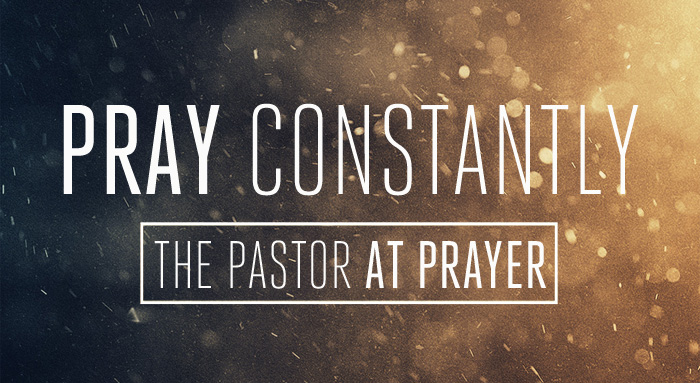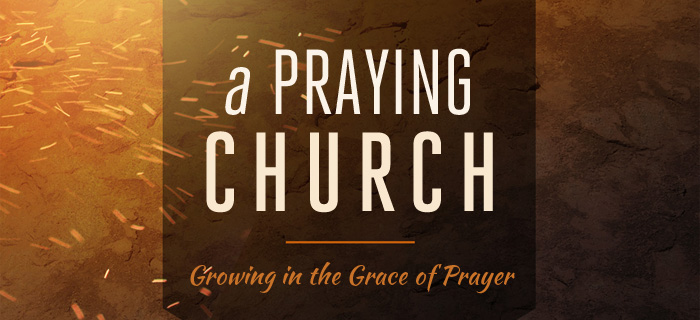A healthy pastor’s prayer life is one that is faithful to the “New Testament Adverbs of Devoted Prayer”: he prays constantly (Rom. 12:12), persistently (Eph. 6:18), steadfastly (Col. 4:2), and unceasingly (1 Thess. 5:17).
If you are anything like me it’s easy to consume your prayer time with immediate needs. These are things for which you depend on God alone, but are also somewhat passing in nature. Maybe it’s the health of a church member, an upcoming decision in leadership, or the lifting up of requests you’ve received. There is a danger, I think, in letting the temporal matters dominate your prayer life. It makes it all the more harder to exhaust the soul in the kind of prayer Jesus advocates for in the Parable of the Persistent Widow.
We would do well to have a list of things to “always to pray and not lose heart.” Every pastor would benefit from making his own list, but to help you along the way, here are seven items that make up the “Perpetual Prayer” category in my prayer list.
7 PERPETUAL PRAYERS
Love. It all begins here doesn’t it? “You shall love the Lord your God with all your heart and with all your soul and with all your strength and with all your mind, and your neighbor as yourself” (Luke 10:27) Furthermore, above all the individual parts of godliness we are to “put on love, which binds everything together in perfect harmony” (Col. 3:14). I pray for God to increase my love for His glory more than my own, for the sacrificial love for my wife to which I am called, the tender love of a Daddy for his children, and that our church would make good on John 13:15, “By this all people will know that you are my disciples, if you have love for one another.”
Faith. We live by faith and not by sight, but oh how I desperately want to often see. It’s therefore quite normal for me to channel my inner Peter and cry, “Lord, help my unbelief!” I pray that He would give me faith to move mountains, that our church would be a community vibrant and in faith, and that God would bring many people faith through our ministry of preaching the word. “How then will they call on him in whom they have not believed? And how are they to believe in him of whom they have never heard? And how are they to hear without someone preaching? And how are they to preach unless they are sent? . . . So faith comes from hearing, and hearing through the word of Christ” (Rom. 10:14-15, 17).
Sound Doctrine. The truth of Scripture, illuminated by the Spirit, is the ordinary way in which God sanctifies His people (John 17:17). I want to always be “increasing in the knowledge of God” (Col. 1:11) and thus enabled more and more to wield the “sword of the Spirit, which is the word of God” (Eph. 6:17). I long to be a pastor who is faithful to “teach what accords with sound doctrine” (Tit. 2:1) and that our church would not perish because we have so deeply loved the truth (2 Thess. 2:10). I also pray for my wife and young boys to cherish the words of God and to feast daily upon them for nourishment and life.
Wisdom. To be honest, I’m not sure I prayed much for wisdom before we planted IDC. But every since the church began my immediate response when members ask how they can pray for me is, “For God to give me wisdom.” Everyday I feel like Solomon in 1 King 3:8-9 when he says to God, “Your servant is in the midst of your people whom you have chosen, a great people, too many to be numbered or counted for multitude. Give your servant therefore an understanding mind to govern your people, that I may discern between good and evil, for who is able to govern this your great people?” Left to my own designs I will make a wreck of my home and church. But if God would increase my fear of Him, that would would be the beginning on immovable wisdom (Prov. 1:7, 9:10).
Holiness. I want to be holy as He is holy (1 Pet. 1:16), and I must be. I need to strive for that “holiness without which no one will see the Lord” (Heb. 12:14). I echo so many towering pastors of old in the belief I have no reason to expect my family’s and church’s holiness to rise above my own. May the Lord conform me increasingly and supernaturally to the image of Christ (Rom. 8:29)! I long for a growing distaste of the word and a sweeter savor of Christlikeness. I pray that God would make our church into the “holy nation” that it is (1 Pet. 2:9). May the Spirit move in my family to help us love nothing more than to please God and so experience His happiness through holiness.
Unity. Aside from the prayers for wisdom, few items more dominate my petitions for our congregation as this one. “Behold, how good and pleasant it is when brothers dwell in unity!” (Psa. 133:1) I pray our church would reflect to glorious unity of the Triune God as we “maintain the spirit of unity in the bonds of peace” (Eph. 4:3). I hope we would increasingly lay aside secondary and tertiary preferences for the sake of unity in the gospel. May we be one even as the Godhead is one (John 17:20-22). I want this unity to permeate my “little church” as well, that our home would be one of joyful harmony in the Spirit.
Evangelism. I must do this work (2 Tim. 4:5) and we – as a home and church – must do this work as well (Matt. 28:18-20). I pray he gives us all confidence and courage in the gospel, “for it is the power of God for salvation to everyone who believes” (Rom. 1:16). I want to be ready in season and out of season (2 Tim. 4:2) with the words of life. I pray He would make me – and us – not only faithful in evangelism, but fruitful in evangelism as well. He “desires all people to be saved and to come to the knowledge of the truth” (1 Tim. 2:4) and so want the faith to expect Him to fulfill this desire through our collective faithfulness in evangelism. There is always an familial accent on this point as our children are all young and, as best we can tell, unconverted. May God give me winsome boldness and may He raise their dead hearts.
UNTIL DEATH OR GLORY
I love these seven prayer categories. Until I die or Jesus returns these prayers will necessarily need to occupy a perpetual place in my ministry.
What other ones would you add?







